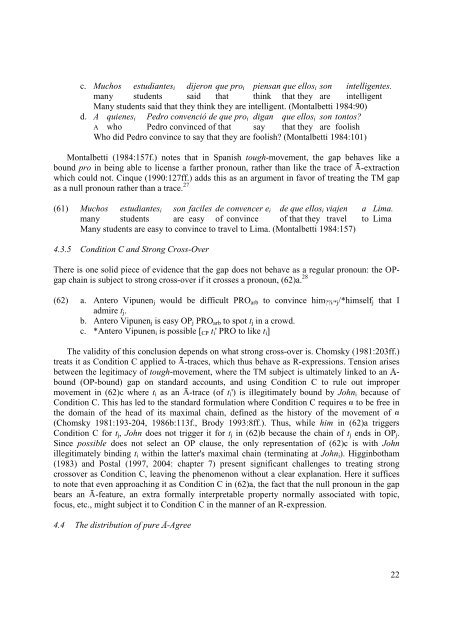1 On tough-movement* Milan Rezac, University ... - Multimania.co.uk
1 On tough-movement* Milan Rezac, University ... - Multimania.co.uk
1 On tough-movement* Milan Rezac, University ... - Multimania.co.uk
Create successful ePaper yourself
Turn your PDF publications into a flip-book with our unique Google optimized e-Paper software.
c. Muchos estudiantes i dijeron que pro i piensan que ellos i son intelligentes.<br />
many students said that think that they are intelligent<br />
Many students said that they think they are intelligent. (Montalbetti 1984:90)<br />
d. A quienes i Pedro <strong>co</strong>nvenció de que pro i digan que ellos i son tontos?<br />
A who Pedro <strong>co</strong>nvinced of that say that they are foolish<br />
Who did Pedro <strong>co</strong>nvince to say that they are foolish? (Montalbetti 1984:101)<br />
Montalbetti (1984:157f.) notes that in Spanish <strong>tough</strong>-movement, the gap behaves like a<br />
bound pro in being able to license a farther pronoun, rather than like the trace of Ā-extraction<br />
which <strong>co</strong>uld not. Cinque (1990:127ff.) adds this as an argument in favor of treating the TM gap<br />
as a null pronoun rather than a trace. 27<br />
(61) Muchos estudiantes i son faciles de <strong>co</strong>nvencer e i de que ellos i viajen a Lima.<br />
many students are easy of <strong>co</strong>nvince of that they travel to Lima<br />
Many students are easy to <strong>co</strong>nvince to travel to Lima. (Montalbetti 1984:157)<br />
4.3.5 Condition C and Strong Cross-Over<br />
There is one solid piece of evidence that the gap does not behave as a regular pronoun: the OPgap<br />
chain is subject to strong cross-over if it crosses a pronoun, (62)a. 28<br />
(62) a. Antero Vipunen j would be difficult PRO arb to <strong>co</strong>nvince him ??i/*j /*himself j that I<br />
admire t j .<br />
b. Antero Vipunen j is easy OP j PRO arb to spot t j in a crowd.<br />
c. *Antero Vipunen i is possible [ CP t i ' PRO to like t i ]<br />
The validity of this <strong>co</strong>nclusion depends on what strong cross-over is. Chomsky (1981:203ff.)<br />
treats it as Condition C applied to Ā-traces, which thus behave as R-expressions. Tension arises<br />
between the legitimacy of <strong>tough</strong>-movement, where the TM subject is ultimately linked to an Ā-<br />
bound (OP-bound) gap on standard ac<strong>co</strong>unts, and using Condition C to rule out improper<br />
movement in (62)c where t i as an Ā-trace (of t i ') is illegitimately bound by John i because of<br />
Condition C. This has led to the standard formulation where Condition C requires α to be free in<br />
the domain of the head of its maximal chain, defined as the history of the movement of α<br />
(Chomsky 1981:193-204, 1986b:113f., Brody 1993:8ff.). Thus, while him in (62)a triggers<br />
Condition C for t j , John does not trigger it for t j in (62)b because the chain of t j ends in OP j .<br />
Since possible does not select an OP clause, the only representation of (62)c is with John<br />
illegitimately binding t i within the latter's maximal chain (terminating at John i ). Higginbotham<br />
(1983) and Postal (1997, 2004: chapter 7) present significant challenges to treating strong<br />
crossover as Condition C, leaving the phenomenon without a clear explanation. Here it suffices<br />
to note that even approaching it as Condition C in (62)a, the fact that the null pronoun in the gap<br />
bears an Ā-feature, an extra formally interpretable property normally associated with topic,<br />
focus, etc., might subject it to Condition C in the manner of an R-expression.<br />
4.4 The distribution of pure Ā-Agree<br />
22
















